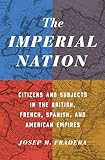The Imperial Nation : Citizens and Subjects in the British, French, Spanish, and American Empires / Josep Fradera.
Material type: TextPublisher: Princeton, NJ : Princeton University Press, [2018]Copyright date: ©2018Description: 1 online resource (416 p.)Content type:
TextPublisher: Princeton, NJ : Princeton University Press, [2018]Copyright date: ©2018Description: 1 online resource (416 p.)Content type: - 9780691167459
- 9780691183930
- 325.32 23
- JC359 .F6313 2018
- JC359
- online - DeGruyter
- Issued also in print.
| Item type | Current library | Call number | URL | Status | Notes | Barcode | |
|---|---|---|---|---|---|---|---|
 eBook
eBook
|
Biblioteca "Angelicum" Pont. Univ. S.Tommaso d'Aquino Nuvola online | online - DeGruyter (Browse shelf(Opens below)) | Online access | Not for loan (Accesso limitato) | Accesso per gli utenti autorizzati / Access for authorized users | (dgr)9780691183930 |
Frontmatter -- Contents -- Acknowledgments -- Introduction -- Chapter One. The Fall of Monarchic Empires -- Chapter Two. The Collapse of Imperial Constitutions -- Chapter Three. The Genealogy of Napoleon's "Special Laws" for the Colonies -- Chapter Four. The British Empire beyond the American Crisis -- Chapter Five. Theory and Practice of French Spécialité -- Chapter Six. Spain and Its Colonies: The survival of The oldest -- Chapter Seven. The Long Road to 1898 -- Chapter Eight. The Imperial Nation -- Chapter Nine. Ruling across the Color Line -- Conclusion -- Notes -- Bibliography -- Index -- A note on the type
restricted access online access with authorization star
http://purl.org/coar/access_right/c_16ec
How the legacy of monarchical empires shaped Britain, France, Spain, and the United States as they became liberal entitiesHistorians view the late eighteenth and early nineteenth centuries as a turning point when imperial monarchies collapsed and modern nations emerged. Treating this pivotal moment as a bridge rather than a break, The Imperial Nation offers a sweeping examination of four of these modern powers-Great Britain, France, Spain, and the United States-and asks how, after the great revolutionary cycle in Europe and America, the history of monarchical empires shaped these new nations. Josep Fradera explores this transition, paying particular attention to the relations between imperial centers and their sovereign territories and the constant and changing distinctions placed between citizens and subjects.Fradera argues that the essential struggle that lasted from the Seven Years' War to the twentieth century was over the governance of dispersed and varied peoples: each empire tried to ensure domination through subordinate representation or by denying any representation at all. The most common approach echoed Napoleon's "special laws," which allowed France to reinstate slavery in its Caribbean possessions. The Spanish and Portuguese constitutions adopted "specialness" in the 1830s; the United States used comparable guidelines to distinguish between states, territories, and Indian reservations; and the British similarly ruled their dominions and colonies. In all these empires, the mix of indigenous peoples, European-origin populations, slaves and indentured workers, immigrants, and unassimilated social groups led to unequal and hierarchical political relations. Fradera considers not only political and constitutional transformations but also their social underpinnings.Presenting a fresh perspective on the ways in which nations descended and evolved from and throughout empires, The Imperial Nation highlights the ramifications of this entangled history for the subjects who lived in its shadows.
Issued also in print.
Mode of access: Internet via World Wide Web.
In English.
Description based on online resource; title from PDF title page (publisher's Web site, viewed 27. Sep 2021)


